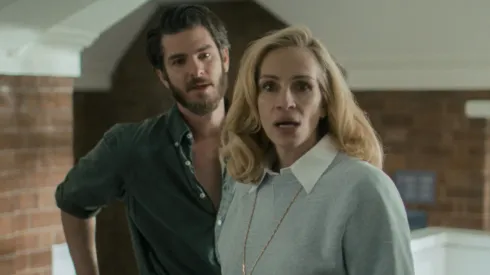Luca Guadagnino‘s 2024 film, After the Hunt, operates not as a traditional mystery, but as a deeply textured character study focused entirely on the seismic fallout of a single, devastating allegation.
Set within the insulated, prestigious environment of an American university, the narrative centers on Simone, a distinguished literature professor, and her complex relationship with her daughter, a student who reveals a potentially career-ending secret about one of the school’s most beloved figures.
For those captivated by the title’s particular cocktail of emotional claustrophobia and moral complexity, a curated selection of cinema exists that explores similar thematic territory. These films share a directorial commitment to slow-burn tension, where the true antagonists are often the systems.
The Hunt (2012)
Directed by Thomas Vinterberg, this Danish psychological drama stands as the most direct thematic parallel to the anxiety of After the Hunt. It follows a beloved kindergarten teacher whose life is systematically dismantled when a small child makes a casual, baseless accusation. The film is a harrowing study in social collapse and communal paranoia, focusing intently on the speed at which a presumption of guilt can obliterate a man’s life and reputation, forcing the viewer to confront the fragility of truth within a tight-knit community.
Compliance (2012)
Craig Zobel’s chilling film is based on a true story, meticulously exploring the dangers of unquestioning institutional obedience and abusive authority. Set in a fast-food restaurant, the tension builds from a simple phone call where a prankster, posing as a police officer, convinces the manager to subject an employee to increasingly invasive and humiliating procedures. It is a terrifying examination of how systems of power, even invisible ones, can compel individuals to commit moral atrocities, echoing the systemic pressures felt in After the Hunt’s academic setting.
Anatomy of a Fall (2023)
The recent Palme d’Or winner, directed by Justine Triet, masterfully dissects a writer’s marriage and reputation after her husband’s suspicious death. Like After the Hunt, the film is less concerned with whodunit and more with who the public believes did it. The extended courtroom drama becomes a forensic psychological examination, where the lines between professional success, marital failure, and criminal culpability are blurred, demonstrating how a private truth can be brutally reconstructed under the lens of public scrutiny.
Notes on a Scandal (2006)
This film immerses itself deeply into the toxic dynamics and suppressed secrets of a British high school environment. It tracks the spiraling obsession of an older history teacher who discovers her colleague is having an illicit affair with a student. The resulting blackmail and psychological manipulation perfectly capture the tight, suffocating pressure of an insulated institution where reputations are built on fragile moral foundations and personal weakness is weaponized.
The Conversation (1974)
Francis Ford Coppola’s masterful work is a slow-burn study in paranoia, surveillance, and escalating guilt. Gene Hackman plays a professional surveillance expert who becomes obsessed with a specific recorded conversation, believing he has uncovered a murder plot. The film excels at the meticulous, unsettling process of investigation and the ethical decay that follows when one’s work forces a confrontation with uncomfortable, deadly truths, resonating with the quiet, methodical tension of an internal investigation.
Prisoners (2013)
Denis Villeneuve’s dark thriller is a powerful exploration of moral compromise and trauma-induced desperation. When two young girls are abducted, the father of one girl takes desperate, violent action after police efforts fail. The film examines the agonizing dilemma of when—and if—it is justifiable to cross absolute moral boundaries in the pursuit of justice, creating a profound, gut-wrenching emotional punch comparable to the deepest moral crises faced by the characters in After the Hunt.
The Handmaiden (2016)
Park Chan-wook delivers a visually lush and intellectually complex thriller centered on deception, betrayal, and power dynamics in 1930s Korea. A complex con game unfolds with multiple twists, where characters continually manipulate each other, hiding their true intentions and allegiances. Its strength lies in its relentless psychological plotting and the way it subverts the audience’s perception of the truth, mirroring the constant suspicion and unreliable narratives of an accusation-driven drama.
The Report (2019)
Though political, this film is structurally and thematically aligned with the slow, institutional fight for transparency and truth. It stars Adam Driver as a Senate investigator who spends years fighting to expose the CIA’s use of torture after 9/11. The tension is derived from the bureaucratic roadblocks, the meticulous handling of classified documents, and the ethical battle against a powerful machinery designed to suppress uncomfortable facts—a key conflict in After the Hunt.
Unforgivable (2011)
Directed by André Téchiné, this lesser-known French drama explores the slow disintegration of a family unit under the weight of past secrets and isolation. An author moves his family to an isolated island off Venice, seeking peace, only for his daughter’s sudden arrival to force long-buried truths about the past to the surface. It shares After the Hunt’s focus on psychological density, minimal action, and the profound, irreversible damage caused by unaddressed family secrets.
Michael Clayton (2007)
Tony Gilroy’s legal thriller features George Clooney as a corporate “fixer” who specializes in suppressing scandal and managing crises for a high-powered law firm. The film’s tension is derived from its exploration of corporate corruption, ethical decay, and the high cost of reputation management. It focuses on the moral awakening of its protagonist as he attempts to navigate a lethal cover-up, powerfully showing the quiet machinery that protects the powerful at the expense of the truth.
